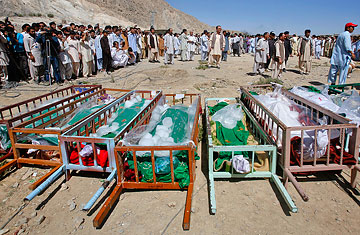
Residents and relatives gather near the coffins of the Shi'ite pilgrims who were killed by gunmen before their burial in Quetta, the capital of Baluchistan province, Pakistan, on Sept. 21, 2011
It began as an ordinary journey, but ended in a bloody storm of sectarian terror. On Monday, 40 Shi'ite pilgrims from the ethnic Hazara community boarded a bus bound for Iran, planning to pay homage at shrines of their revered saints. Near the town of Mastung, in Pakistan's southwestern Baluchistan province, the bus juddered to a halt when a pickup truck swerved in front of it, blocking its path. The bus driver later told reporters that a second pickup pulled up alongside, and men bearing rocket launchers and automatic rifles leapt from both vehicles.
As the attackers forced the passengers off the bus, some managed to flee, sparing themselves. The others were lined up in front of the bus and summarily shot — 26 were killed and six wounded. The gunmen then left the scene, with Pakistani security forces arriving only an hour later to find relatives wailing over blood-soaked bodies. On Wednesday, the survivors, who had set out to mourn at the shrines of their ancient martyrs, instead lowered new ones into fresh graves. Shi'ites, who make up over a quarter of Pakistan's population, are deemed "apostates" by many extremist sectarian Sunni groups.
Responsibility for the attack on the long-suffering Hazaras of Baluchistan was claimed by Lashkar-e-Jhangvi (LeJ) — a group also suspected of a devastating attack earlier in the week on the home of a senior police officer in Karachi who has a record of taking on the militants. Though little known in the West, LeJ, a sectarian extremist outfit linked to al-Qaeda and to the Pakistani Taliban, is now widely considered Pakistan's most dangerous terrorist group.
While al-Qaeda has suffered a series of setbacks after CIA drone strikes killed successive leaders based in Pakistan's tribal areas, its local affiliate remains unimpeded. "We haven't seen any change in their capacity," laments Muhammad Amir Rana, the director of the Pak Institute for Peace Studies and an expert on Pakistani militant groups. And few seem willing to change that. The army is reluctant to confront its bases with force; the police have failed to protect those it threatens; the judiciary is unable to successfully prosecute its leading members; and some politicians have sought to appease it with shady deals.
LeJ began life as a particularly vicious offshoot of the banned anti-Shi'ite Sipah-e-Sahaba organization. The sectarian group, with its cells seeded throughout the country, held both doctrinal and organizational appeal for al-Qaeda, which used LeJ's deep and pervasive network to expand its own presence into Pakistan. While al-Qaeda had operational command, LeJ supplied foot soldiers to carry out attacks. The September 2008 attack that turned the Islamabad Marriott into a smoldering heap was the most dramatic demonstration of their collaboration. It is also believed to have been involved in the March 2009 attack on the visiting Sri Lankan cricket team in Lahore, which spelled the end of international sports events being hosted in Pakistan. Later that year, LeJ members were involved in the dramatic 24-hour siege of the army's headquarters in Rawalpindi. Hoping to end that embarrassing assault, the army sent the plane of General Ashfaq Kayani, the army chief, to collect notorious LeJ leader Malik Ishaq from his prison cell to negotiate with the attackers.
In July, Ishaq was freed from prison, securing bail after the Supreme Court said there was a "lack of evidence" to prosecute him. Many were alarmed that a man who had boasted of killing many Shi'ites and who has a history of inciting others to do the same could not be successfully prosecuted. According to observers familiar with the case, the witnesses in the case were either eliminated or were too afraid to appear in court.
"There is no witness-protection program in Pakistan," says analyst Ejaz Haider. "These are people who have such a terrifying reach that they have been able to run their terrorist networks from jail," he adds. "How will people come to court and testify against them?"
A day before the massacre near Mastung, Chaudhry Aslam Khan, the senior police officer, was jolted awake in his Karachi home by a 660-lb. (300 kg) bomb delivered by a suicide bomber in a car. The blast destroyed nearby buildings and cars, left a 10-ft. (3 m) crater and killed six policemen, a mother and her son — the deadliest such attack to strike the well-heeled part of Karachi inhabited by its defense elite. And the militants' willingness to strike not just the target but also his family signals a new trend, some fear.
For over two years now, Washington has been urging Pakistan to take on militants in North Waziristan, which is home to the Haqqani network (blamed by the U.S. for the recent attack on its embassy in Kabul), al-Qaeda's surviving leadership, the Pakistani Taliban and also, according to a senior military official, the headquarters of LeJ. The Pakistani military's reluctance to enter North Waziristan creates a permissive environment not only for groups that operate against NATO in Afghanistan, but also for those like LeJ who wreak havoc inside Pakistan.
It's not only the military that appears to be passive in the face of LeJ. In Punjab, where the group was founded and where leaders like Ishaq continue to openly preach hatred, the provincial government has entered a nonaggression pact with LeJ, says analyst Rana. The Punjab government is alleged to allow LeJ and its parent organization, Sipah-e-Sahaba, to operate with some freedom in return for electoral support. In Karachi and in Baluchistan, where the massacre near Mastung took place, Shi'ites complain that the police are not offering them protection. "It's certainly not a question of capacity," says analyst Rana. "It's a question of will."
